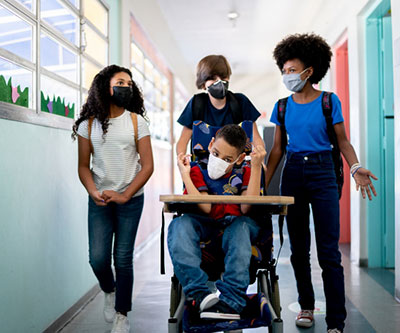
NICHD supports COVID-19 research to better address the needs of women, children, and people with disabilities as the pandemic evolves. Findings from this work have helped inform school polices, identified potential new treatments, and addressed long-term health concerns.
One NICHD-supported study evaluated the microbiome’s protective effects against SARS-CoV-2 infection. Using mouse models and cultures of human cells, the researchers found that the gut microbiome can protect against nasal infection by producing short-chain fatty acids (SCFAs). SCFAs guarded host cells by downregulating the SARS-CoV-2 entry receptor—angiotensin-converting enzyme 2 (ACE2). These SCFA compounds also regulated the body’s coagulation response, which can be dysregulated in severe cases of COVID-19. SFCAs also enhanced adaptive immune responses, contributing to immune memory.
Another NICHD-supported study tested a home-based treatment to manage long COVID symptoms. The pilot effort evaluated a type of non-invasive brain stimulation called transcutaneous auricular vagus nerve stimulation (taVNS), which delivers electrical stimulation to the vagus nerve through sensors placed on the outer ear canal. Previous studies indicate that this type of therapy, when done in the clinic, can reduce pain, improve cognition, and help manage a variety of neuropsychiatric disorders. The study team developed a telemedicine-based taVNS treatment that was self-administered twice a day for up to four weeks. The researchers found that the therapy was safe and feasible, and patients also had a mild improvement in their self-reported symptoms. A larger study is needed to better evaluate clinical effects.
As part of NIH’s RADx-UP program, NICHD-funded scientists continue to study COVID-19 transmission in school settings to optimize the safety of in-person learning. One study, which included more than 1.1 million students attending in-person school across nine states, found that schools with mandatory masking during the Delta surge had approximately 72% fewer cases of in-school transmission of SARS-CoV-2, compared to schools with optional or partial masking policies. A group of NICHD-funded researchers in North Carolina had established the ABC Science Collaborative to collect COVID-19 transmission and mitigation data from schools. In turn, the Collaborative’s information was used by local officials to inform safety procedures for full-time, in-person reopening of public schools. A different NICHD-funded research team helped define school safety measures for children with disabilities and medical complexities who are at higher risk of complications from COVID-19. The researchers describe several models to screen and test for SARS-CoV-2 infection among these high-risk groups, with the goal of identifying effective strategies that can be used across the United States for current and future pandemics.
 BACK TO TOP
BACK TO TOP